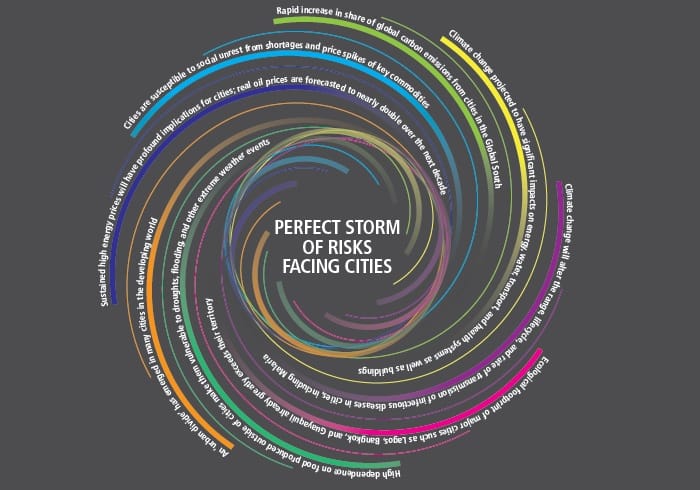Window of opportunity for climate-proofing cities is 'closing'

 Time is running out for fast-growing cities in the developing world to prepare for the impacts of climate change while also reducing poverty among their citizens.
Time is running out for fast-growing cities in the developing world to prepare for the impacts of climate change while also reducing poverty among their citizens.
“There is an important – but closing – window of opportunity for many cities to act now before they are locked into unsustainable and unsuitable development pathways,” notes a new report on “Future Proofing Cities.”
Prepared by Atkins Global, the UK Department for International Development (DFID) and University College London (UCL), the report looks at 129 cities with a total current population of 350 million and asks how these cities might best “future-proof” themselves against climate hazards, resource scarcities and damage to ecosystems.
“The earlier cities take steps to future proof themselves the better,” said Atkins UK CEO David Tonkin. “As this report demonstrates, these are complex challenges which require deep technical skills brought together to understand the scale and urgency of the risks that cities face.”
Among those challenges are:
- Growing risks of urban flooding – Recent floods in Bangladesh, for example, put 85 percent of Dhaka underwater;
- Rising prices for food and other vital resources – Increased food costs in the second half of 2010 pushed 44 million additional people into poverty, the report notes;
- Loss of ecosystem services – For instance, water provision, flood prevention and other natural benefits from urban green spaces are currently worth $418 million per year to the South African city of Durban.
Helping cities address these challenges before they grow overwhelming will take a combination of strategies … some of which themselves pose large challenges. Finding ways to finance future-proofing steps, for example, is difficult, especially for many cities in the developing world. However, the report notes, “some action is already taking place,” with organisations including the World Bank, the Asian Development Bank and the Clinton Foundation making climate finance more of a priority.
Cities also need to improve how they diagnose risks, make better use of data in decision-making and strengthen their urban governance, planning and delivery systems, the report adds.
“Future proofing should not be seen as an end state, but as a continuous process of better understanding the risks facing cities,” it states, adding a call for leadership by “city stakeholders, regional and national government, international funding agencies, philanthropics, academia, and private sector companies to plan for the long term by acting now to support cities to future proof their development.”




